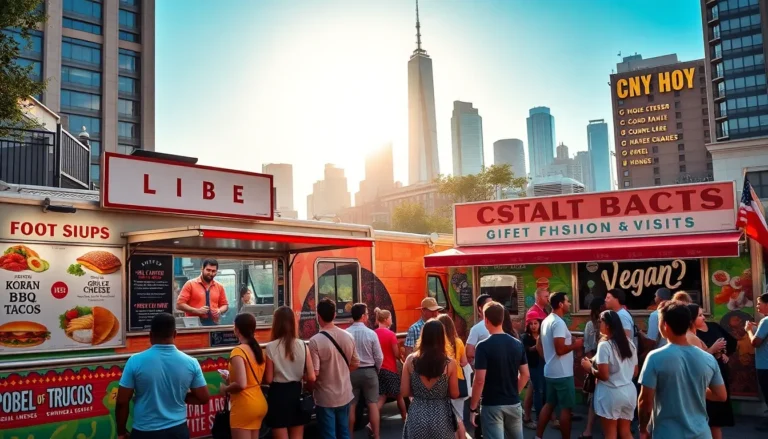In a world where cupcakes can be a valid breakfast option and avocado toast reigns supreme, food trucks have emerged as the rebellious little siblings of the culinary world. They roll into town, often nestled in a cozy corner, serving gourmet dishes without the stuffy reservations or white tablecloths. Ever wondered why some food trucks outshine the rest? Spoiler alert: it’s not just about unique tacos or Instagram-worthy dishes. Success hinges on understanding consumer trends, connecting with patrons, and creating an experience that keeps customers coming back for more. Let’s jump into the savory details.
Table of Contents
ToggleUnderstanding Food Truck Success

What defines success for a food truck? Is it the number of meals served, the reviews on Yelp, or perhaps the social media followers? A successful food truck isn’t just about mobility: it’s about mastering the nuances of consumer preferences. Understanding these vital trends can allow an owner to adapt in a rapidly changing landscape. The best food trucks resonate with their audience, providing more than just a meal, they offer an experience that involves engaging with customers, showcasing their passion for culinary arts, and finding ways to innovate.
The Rise of Food Trucks in Modern Dining
The food truck phenomenon has exploded in recent years, morphing from casual street fare to culinary hotspots. People no longer view food trucks as just a late-night snack option. Nowadays, they expect gourmet meals on wheels that can rival their favorite sit-down restaurants. This shift in consumer perception has created new opportunities for food truck owners. They are now competing in a thriving market where quality, originality, and convenience are key ingredients. With more food trucks dotting city streets, standing out becomes essential, which is where understanding consumer trends takes center stage.
Emphasizing Fresh and Local Ingredients
When customers see ‘farm-to-table’ on a menu, it’s like catnip for foodies. There’s an undeniable appeal to freshness and locality. Food trucks that emphasize fresh, locally-sourced ingredients are not only tapping into consumer desires for healthy options but also supporting local farmers and economies.
The Importance of Unique and Diverse Menus
A diverse and unique menu can set a food truck apart from the competition. People crave variety, and a striking menu can entice customers to explore new flavors. Think outside the traditional box, fusion cuisines, seasonal specials, and creative combinations that reflect culinary trends. People love sharing their food experiences on social media, and a remarkable dish can lead to viral posts.
Catering to Dietary Preferences and Restrictions
Today, more consumers pay attention to dietary preferences and restrictions than ever before. Vegan, gluten-free, and keto options aren’t just trends: they’re necessities for many. Food trucks that can cater to these demands, and even provide alternatives, have better chances of satisfying a broader audience. With dietary needs evolving, food trucks should innovate their offerings to stay ahead.
Leveraging Technology and Social Media
Technology isn’t just a luxury: it’s vital for the modern food truck. From online ordering systems to mobile apps, leveraging technology can streamline operations and enhance customer interaction.
Building a Community Connection
Social media is a powerful tool that food truck owners must use. Instagram and Facebook can help tell the story of a food truck, engage with local communities, and even announce locations in real time, like calling dibs on the best taco spot in town. Engaging with community members fosters loyalty and creates buzz. Customers are more likely to return when they feel a sense of belonging.
Participating in Local Events and Collaborations
Food trucks that collaborate with local breweries, farmers’ markets, and festivals experience a significant boost in visibility. Participation in these events provides exposure and creates a sense of partnership, making the brand feel more integral to the community. Events also allow food trucks to showcase their skills, attract new customers, and connect with existing ones.
Creating a Memorable Brand Experience
The food truck experience is about more than just the food. A memorable brand experience can set a food truck apart in a sea of culinary competitors. This experience extends beyond the food itself: it encompasses everything from the truck’s design to customer interactions.
Effective Marketing Strategies for Food Trucks
Visual appeal plays a significant role in attracting customers. Eye-catching truck designs, engaging signage, and appealing packaging can draw onlookers and convert them into customers. Also, effective marketing strategies such as loyalty programs or giveaways can help in retaining customers and encouraging repeat visits. A well thought out marketing plan tailored to local communities can yield impressive dividends.
Engaging with Customers and Building Loyalty
Engaging directly with customers can lead to cultivating loyalty. Providing excellent customer service and fostering personal connections can make customers feel valued. Conversations about favorite dishes or even a simple acknowledgment of their presence can transform a casual visitor into a loyal patron.
Adaptability and Innovation in Menu Offerings
Flexibility is crucial for success in the food truck industry. Trends shift like the wind, and what seems popular today may quickly fade. Food trucks should remain adaptable by updating their offerings regularly to reflect current consumer preferences. This propensity for change can keep things fresh and exciting, making customers eager to return and see what’s next.


